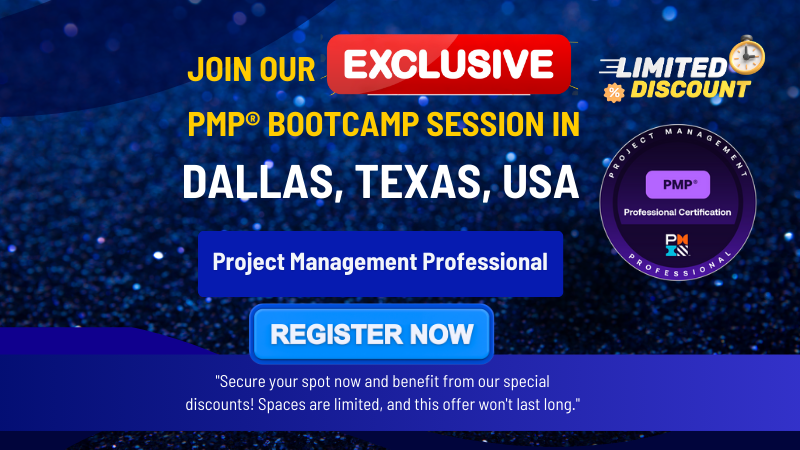
by DharamCW | Mar 21, 2025 | vCare PMI Certification Training Classes
🚀 Get PMP® Certified with vCare Project Management | March 27th – 30th, 2025 | Live in Dallas 🎯
I’m excited to personally lead our upcoming PMP® Bootcamp in Dallas—an intensive 4-day program designed to equip you with everything you need to achieve PMP certification and accelerate your project management career.
📍 Date: March 27th – 30th, 2025
⏰ Time: 9:00 AM – 5:00 PM (CDT)
📌 Location: Dallas, Texas
🎓 PMI-ATP Authorized Training
🔗 Register Now: https://bit.ly/3Y3zn09
💼 What You’ll Gain:
✅ Access to PMI Authorized PMP® Exam Prep Content
✅ 35 Contact Hours/PDUs
✅ Complete application and audit support
✅ Real-world strategies, tips, and exam mastery techniques
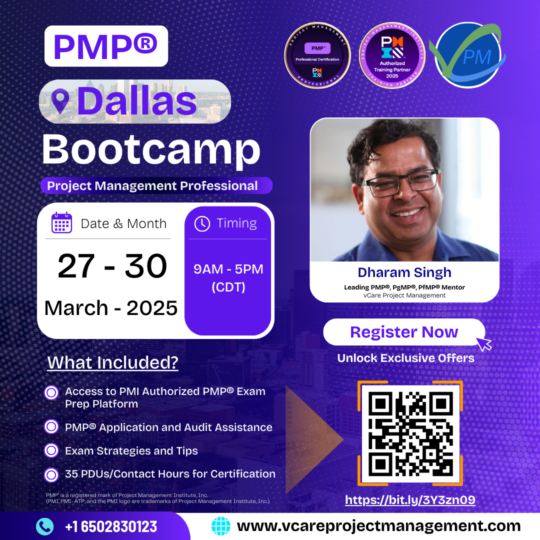
Accelerate your project management career with PMP certification—join our Dallas Bootcamp from March 27–30, 2025, led by Dharam Singh.
Having mentored over 540+ PMP®s, 542+ PgMP®s, and 168+ PfMP®s globally, I bring 30+ years of experience into every session—bridging theory with practical execution.
🧭 Explore Other PMP Offerings:
🎯 Direct Bootcamps: http://bit.ly/3ic7GRF
🎯 Online Mentoring Programs: https://bit.ly/2BU0mFp
🎯 Fast Track Personal Mentoring: http://bit.ly/38gosHu
📝 PMP Application Support: http://bit.ly/3esggIb
💬 Need Help Choosing the Right Path?
Book a FREE 15-minute consultation with me:
🔗 http://www.talktodharam.com/
📺 Stay Connected:
🔔 Subscribe to our YouTube Channel – Project Management Q&A & Success Stories: https://bit.ly/2YF0wJl
🎙 Follow my Podcast Interviews with Project Management Experts: https://bit.ly/2NDY8wd
📞 Questions? Call us at +1 650 283 0123
🌐 Visit: https://www.vcareprojectmanagement.com
Take the next step with confidence. Let’s make your PMP journey a success! 💪
#PMPBootcamp #ProjectManagement #PMPCertification #Dallas #vCareProjectManagement #PMI #CareerGrowth #DharamSingh #PMIATP #Leadership #PMPTraining #Mentorship #PDUs #PMICertification
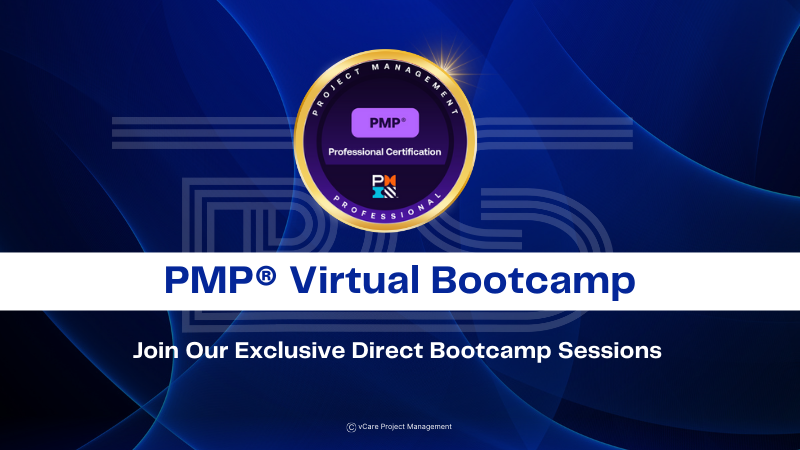
by DharamCW | Jul 3, 2024 | vCare PMI Certification Training Classes
🌟 Elevate Your Project Management Career with Our PMP Certification Online Virtual Boot Camp Course! 🌟
Ready to take your project management career to the next level? Look no further! Join our intensive 4-day PMP virtual boot camp course designed to prepare you for the PMP exam and boost your career prospects. 🚀
Course link: http://bit.ly/3YAvqiR
Date: 6, 7, 13 & 14 July 2024
Time: 12 PM (PDT), 1 PM (MDT), 2 PM (CDT) / 3 PM (EDT) / 4 PM (BRT) / 8 PM (BST)
📚 Course Highlights:
• PMI® Authorized PMP® Exam Prep aligned with PMBOK edition 7
• Dive deep into key topics, discuss exam-type questions, and master answering techniques
• Personal coaching and mentoring at every step
• Assistance in completing your PMP application and navigating the audit process
• Earn 35 PDUs/Contact Hours to meet certification requirements
🔍 Course Outline:
• Understand the project management fundamentals
• Learn to apply international project management standards to real-world scenarios
• Develop leadership skills to motivate your team and drive project success
• Gain insights into project closure and benefits realization
🎯 Who Should Attend:
• Project Managers, Senior Managers, Project Team Members
• VPs/AVPs, PMO/PMO consultants
• Anyone leading large-scale projects
Take advantage of this chance to enhance your skills and unlock new career opportunities. Enroll now to secure your spot in our upcoming PMP Bootcamp!
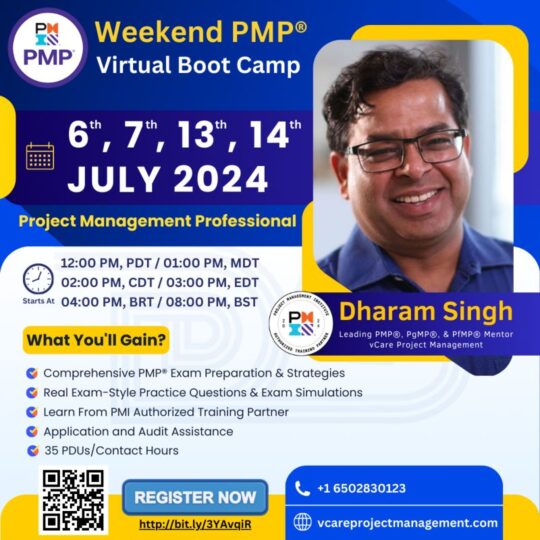
Prepare for PMP success! Join our intensive 4-day virtual boot camp and fast-track your project management career. 🚀
Enroll Now and Secure Your Spot!
For any questions related to your Project Management career, training, and certifications, you can book an obligation 15-minute session with me by visiting talktodharam.com
Join our PMP4U LinkedIn Group for the latest updates – https://bit.ly/30gV5QX.
Explore our useful PMP Study Materials:
vCare PMP Exam Simulator – 1 Year Access: https://bit.ly/41BFc6A
PMBOK Guide | 7th Edition: http://bit.ly/2Z2Zn1b
#ProjectManagement #PMPCertification #CareerDevelopment #ProfessionalGrowth #PMP #PMPOnlineTraining #ProjectManager #PMPExam #PMPTraining #PMPBootcamp #PMBOK #LeadershipSkills #AgileMethodologies #PMPExamPrep #AskDharam #DharamSingh #DharamSinghPMP #VCareProjectManagement

by Dharam CW2 | Apr 22, 2024 | PMI Certification Success Stories
🎉 Celebrating Excellence in Program & Portfolio Management! 🌟
It’s time to celebrate the incredible achievements of a dedicated group of professionals. Congratulations to each of you who obtained your PfMP® and PgMP® certifications with the guidance and support of vCare Project Management from February to March 2024! 🚀
Many professionals now find inspiration in your success, highlighting the effectiveness of vCare Project Management’s training and mentoring programs.
Thank you for embarking on this journey with us.
Global Impact by the Numbers:
According to the PMI Fact File as of December 2023:
🌍 1,701 active certified PfMP® professionals globally
🌏 5,350 active certified PgMP® professionals globally
vCare’s Global Reach:
🎓 Supported 136 PfMP®s across 28 countries
🎓 Supported 500 PgMP®s across 54 countries
🌟 To Aspiring Certification Candidates Worldwide:
If you’re a Project, Program, or Portfolio Management Professional looking to boost your career, let this success story inspire you. Although the journey towards certification can be challenging, it is worth embarking on with the right guidance and support. At vCare Project Management, we are dedicated to being a part of your success story by providing you with the necessary expertise and support to help you achieve your goals.
🔍 Looking Ahead:
Accompany more professionals on their learning journey and support their growth and achievements in the upcoming years. Here’s to a year of success stories!
🚀 Elevate Your Project Management Career:
– Book an obligation-free consultation session on Project Management career, training, and certifications: http://talktodharam.com
– Discover training offers and certification discounts: https://bit.ly/3jWVepD
– Stay updated with our Q&A series and certification success stories by subscribing to the vCare Project Management YouTube channel at https://bit.ly/2YF0wJl
– Follow my podcasts and interviews with Project Management Experts on YouTube at https://bit.ly/2NDY8wd

by DharamCW | Jan 30, 2024 | Program Management
Navigating the PgMP Exam: Pitfalls to Avoid
As you embark on the journey to achieving your PgMP® certification, steering clear of common preparation pitfalls is crucial. Let me try to guide you through the maze of exam prep with insights to help you avoid common mistakes.

Common mistakes during PgMP exam preparation
📚 Understanding the Exam: Don’t underestimate the intricacies of the PgMP®. A deep dive into the exam’s structure is essential for a targeted study plan.

Not understanding exam complexity
📖 Essential Reading: Bypassing the PMBOK® Guide 7th Edition, ECO, and PMI Ethics can leave gaps in your knowledge. Ensure these cornerstones are part of your study routine.

Not reading PMBOK Guide 7th Edition, ECO, and PMI Ethics
🎯 Not taking professional assistance: Avoiding expert advice may hinder effective exam preparation strategies and techniques. Consider taking professional assistance to develop effective preparation strategies and techniques.

Not taking professional assistance
🧠 Beyond Memorization: While memorization has its place, grasping concepts truly empowers you. Engage with the material to internalize the principles.

Dependency on memorization techniques
📚 Selective Reading: Resist the temptation to read every book on the shelf. Focus on key resources to build a strong, concentrated foundation of knowledge.

Reading too many books
⏱️ Time Management: The exam clock is ticking. Develop a strategy to navigate through questions, balancing speed with accuracy efficiently.

Poor time management during exam
Avoiding these common missteps can be the difference between merely taking the exam and passing it with flying colors.
Follow me on,
Linkedin – https://bit.ly/3jJ0zeS
Facebook – https://bit.ly/3jQRTmV
Pinterest – http://bit.ly/40H4Fdu
Twitter – http://bit.ly/3zB4Qv0

Follow Me
🚀 Elevate Your Project Management Career:
– Register for my upcoming PgMP/PfMP Success Story Webinar: https://bit.ly/3vL2Q4J
– Book an obligation-free consultation session on Project management Career, training, and certifications: http://bit.ly/2SbhTOK
– Discover training offers and certification discounts: https://bit.ly/3jWVepD
– Stay updated with our Q&A series and certification success stories by subscribing to the vCare Project Management YouTube channel at https://bit.ly/2YF0wJl
– Follow my podcasts and interviews with Project Management Experts on YouTube at https://bit.ly/2NDY8wd

by DharamCW | Jan 16, 2024 | Professional Development Webinars
🚀 Empower Your Project Management Journey with PMP® & CAPM® Insights
I am to announce our upcoming online sessions designed to unravel the complexities of PMP® & CAPM® certifications! Join me as we delve into the key strategies and knowledge you need to excel in these certifications.
📆 Dates to mark:
– Session 7: January 17, 2024
– Session 8: January 25, 2024
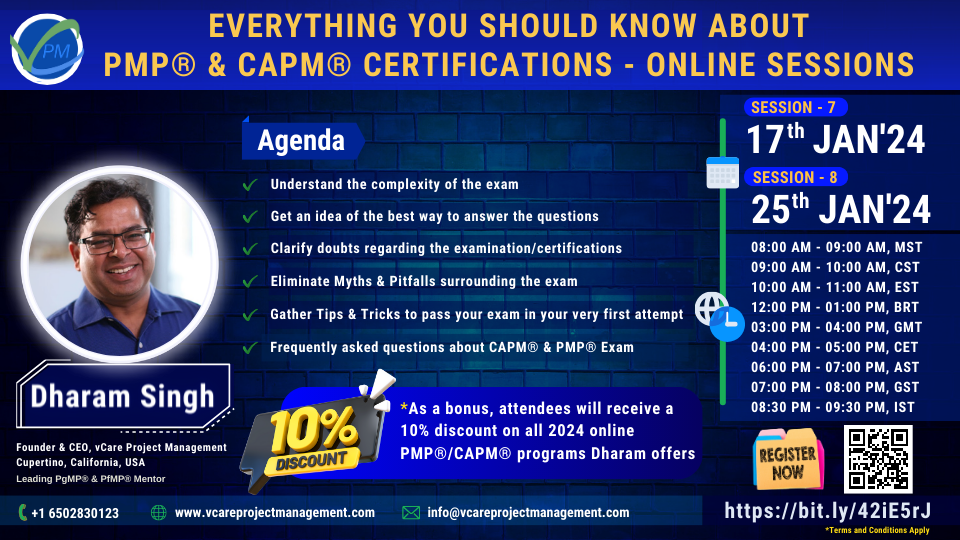
Everything You Should Know About PMP & CAPM Certifications
🔑 We’ll cover everything from:
– Demystifying the exam format and best answering tactics
– Clarifying all your certification questions
– Debunking myths to steer clear of common pitfalls
– Insider tips to help you pass on your very first try
– Addressing all your queries about CAPM® & PMP® Exams
As a special incentive, attendees will enjoy a 10% discount on all our 2024 online PMP®/CAPM® programs!
Ready to take your project management skills to the next level? Click the link to register now and join a community passionate about growth and excellence in project management.
🔗 Register here: https://bit.ly/42iE5rJ
Let’s set the stage for your success together!






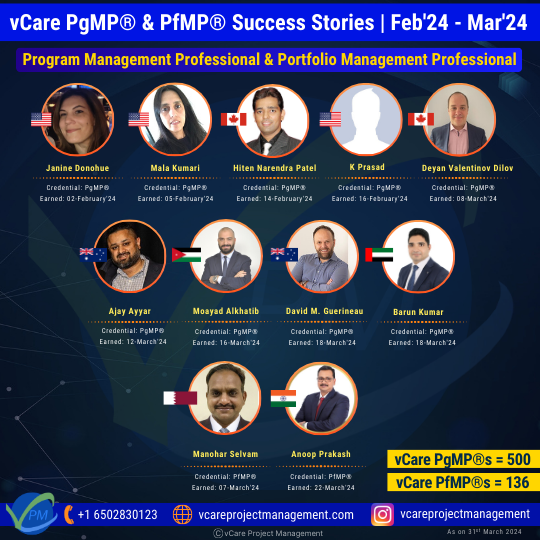











Recent Comments